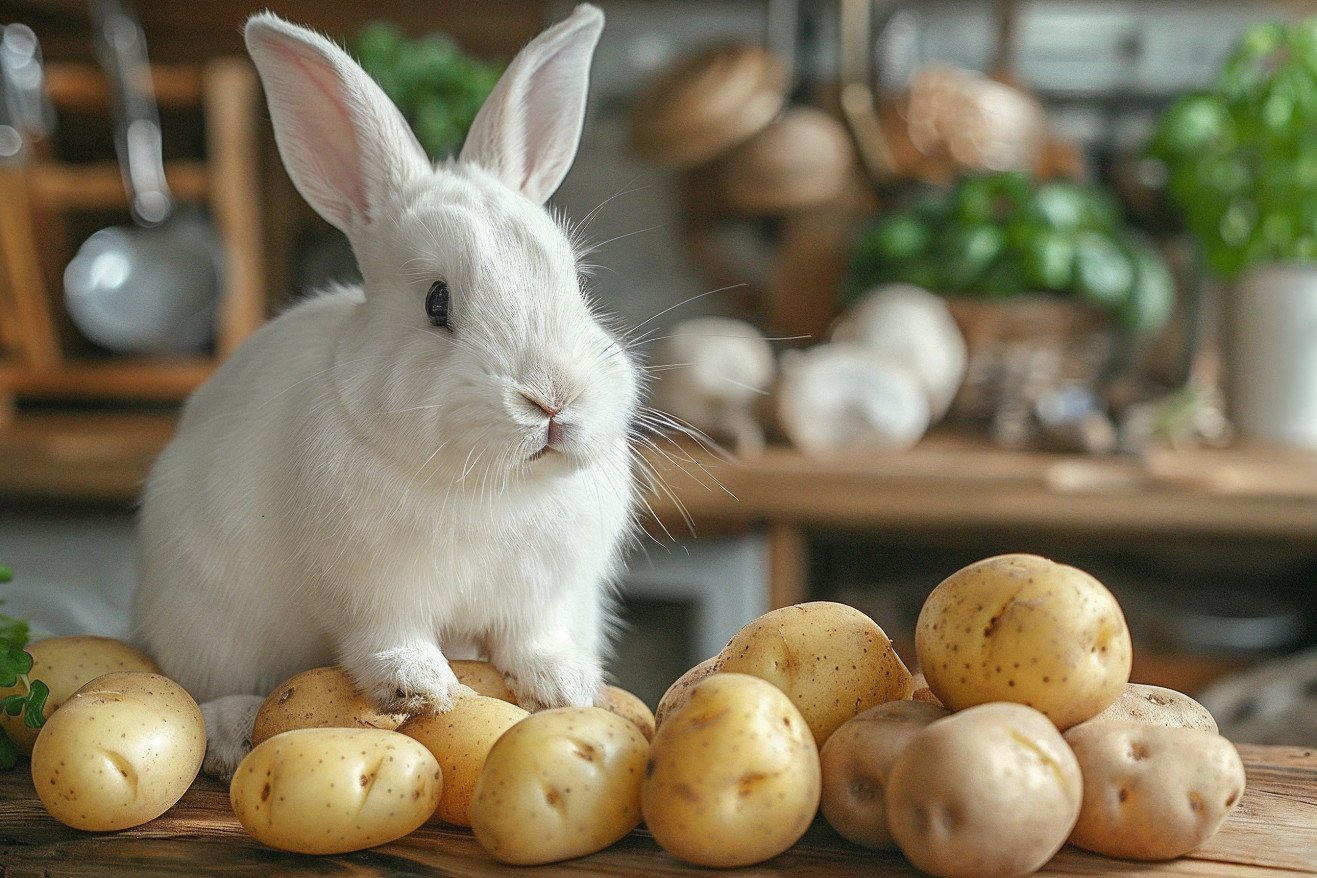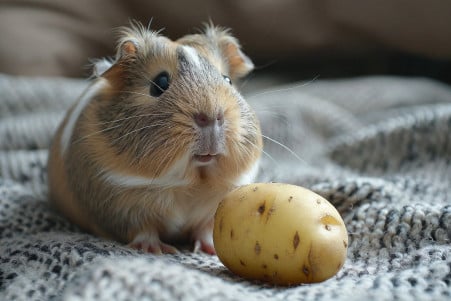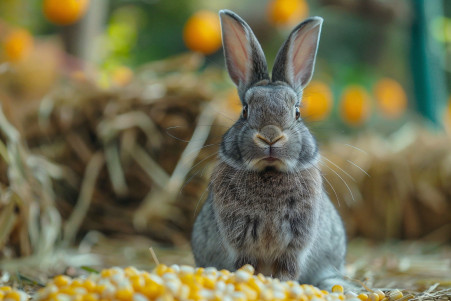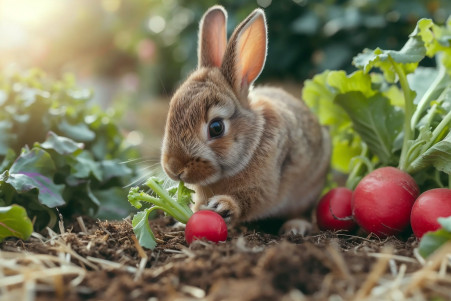Can Rabbits Eat Potatoes? Important Dietary Tips for Pet Parents
26 February 2024 • Updated 26 February 2024

Even though rabbits eat a wide range of vegetables, do potatoes make the cut? No, rabbits cannot eat potatoes. The high starch level in potatoes can cause digestive upset in rabbits and they don’t have much nutritional value. Rabbits can also experience severe toxicity if they eat the entire potato plant, including the leaves and vines.
This article delves into several scientific papers and expert opinions from the fields of veterinary medicine, animal nutrition, and toxicology to explain why potatoes are not a good choice for rabbits. It covers the rabbit’s unique digestive system, the potential negative impacts of some of the compounds in potatoes, and finally, provides evidence-based options to help you ensure your pets stay healthy and content.
Can rabbits eat potatoes?
How a Rabbit’s Digestive System Works
Rabbits have a digestive system that uses a process called “hindgut fermentation” to break down the fiber that they eat. A study by Purina Animal Nutrition found that rabbits, like horses, have a cecum that contains bacteria that’s necessary for fiber digestion. This process not only helps rabbits get the nutrients that they need from their food but also helps them get energy by supporting the bacteria in their gut.
Supreme Petfoods explains that good-quality fiber, which is the foundation of a rabbit’s diet, is essential for the rabbit’s digestive system to work properly. On the other hand, starchy foods like potatoes are problematic because they are low in fiber and hard for rabbits to digest, which can lead to digestive upset.
Cecotrophy, which is the process of rabbits eating special fecal pellets called ‘night feces,’ is how rabbits make sure that they get all of the nutrients that are created by cecal fermentation. A study in Veterinary Clinics: Exotic Animal Practice explains that cecotrophy is an important part of rabbit digestion because it helps rabbits absorb the bacteria and by-products that are good for them.
Understanding how the rabbit digestive system works makes it clear how important it is for rabbits to eat a fiber-rich diet and avoid certain foods, especially those that are high in starch like potatoes.
Potatoes Contain Solanine, Which Is Toxic to Rabbits
While potatoes may seem like a harmless vegetable, they actually contain a dangerous substance for rabbits: solanine. Potatoes are a member of the nightshade family, which contains solanine, a glycoalkaloid poison.
According to Michigan State University Extension, the presence of solanine is indicated by the green parts of a potato, and it can be toxic if consumed in large amounts. Even small amounts can be toxic to rabbits, whose digestive systems aren’t equipped to process such toxic compounds.
The symptoms of solanine poisoning in rabbits can vary from gastrointestinal issues to more serious neurological problems. Mount Sinai notes that diarrhea, abdominal pain, and slow breathing in rabbits are all signs of the toxic effects of solanine, which is similar to how it affects humans.
Rabbits are especially sensitive to these compounds due to their small size and unique metabolism, which makes the entire potato plant, including the leaves and vines, a danger to their health.
Rabbit owners need to be on the lookout. Rabbit owners need to know the symptoms of solanine toxicity and why it’s important to avoid not just potatoes but other solanine-containing foods to keep their pets safe. Make sure you’re keeping your rabbits safe by avoiding these dangers and focusing on a diet that meets their unique needs.
Nutritional Requirements of Rabbits
Because of their unique digestive systems, rabbits need a diet that is high in fiber. According to the Merck Veterinary Manual, dietary fiber is important for rabbits, and a minimum of 15% crude fiber is recommended to maintain intestinal motility and reduce the risk of disease. Hay, especially timothy hay, is the most important part of a rabbit’s diet, as it acts as a base that absorbs bacterial toxins and helps the body excrete them.
Water is also an important part of a rabbit’s diet, and the Merck Veterinary Manual reports that rabbits drink an average of 120 mL/kg/day. This is important for keeping rabbits hydrated and supporting their high-fiber diet.
Rabbit pellets are another important part of a rabbit’s diet, but they should be fed in moderation. According to the Manual, pelleted diets are nutritionally balanced when they are fed as the sole source of nutrition and are given in the amount recommended by the manufacturer.
However, the way that carbohydrates are digested in a rabbit’s cecum means that high-starch foods, like potatoes, are not a good choice. These foods can upset the balance of the rabbit’s cecum, which can lead to gastrointestinal problems and changes in the beneficial caecal microflora.
Because of the way that rabbits’ digestive systems work, it’s important to make sure that they are getting the right nutrients in their diet. Because of their unique nutritional needs, it’s important for rabbit owners to make sure that their pets are getting a diet that is primarily made up of hay and leafy greens, that provides enough hydration, and that includes a moderate amount of pellets.
This will make sure that their nutritional needs are met and that their digestive systems are protected.
Other Healthy Foods to Feed Your Rabbit
If you’re looking for other healthy foods to feed your rabbit, the Rabbit Welfare Association & Fund lists a variety of leafy greens that are also recommended by the RSPCA. These can make a great alternative to potatoes.
Feed a packed handful of washed leafy greens, which is about the size of an adult rabbit’s head, once a day, making sure to offer at least five to six different types to ensure a good variety.
Some of the safe leafy greens you can feed your rabbit include romaine lettuce, kale, and dandelion greens. These leafy greens are low in calories and high in fiber, which can help support healthy dental and digestive systems.
In addition to leafy greens, rabbits can also eat small amounts of vegetables, including bell peppers and asparagus, according to Rabbit.org. However, you should always introduce these vegetables slowly to avoid digestive issues and watch your rabbit for 24 hours after introducing them to make sure they don’t have any adverse reactions.
The RWAF also lists a variety of rabbit-safe fruits, including apples and carrots, but these should be fed in moderation due to their high sugar content.
Hay is an important source of fiber and a staple of a rabbit’s diet. Timothy or meadow hay should be available to your rabbit at all times, according to Save a Fluff. You should also make sure to offer fresh and clean water every day, which is just as important.
Carefully choose and introduce these healthy foods to your rabbit to help supplement their diet and improve their overall well-being. And don’t forget to wash all fresh foods thoroughly before feeding them to your rabbit and avoid feeding them lawnmower clippings or plants from the roadside to help keep them safe.
Conclusion: Rabbits and Potatoes
Potatoes are a common household food that is not safe for rabbits to eat. Due to their high starch content and the presence of solanine, potatoes can cause a range of health problems in rabbits, from digestive issues to toxicity. This highlights the importance of understanding the specific dietary needs of our lagomorph friends to help them live long and healthy lives.
As rabbit owners, it is our job to provide a diet that meets rabbits’ natural needs for high-quality fiber, which is primarily found in hay and fresh leafy greens. Introducing a variety of vegetables and the occasional safe fruit as a treat can help ensure that our rabbits have a balanced and enjoyable diet.
By taking on the role of knowledgeable and loving caretakers, we can help ensure that our rabbits are happy and healthy. Good nutrition is more than just a part of our daily routine; it is a way to show our love and dedication to the animals in our care. So, let’s skip the potatoes and choose healthier, rabbit-friendly options that will help our rabbits thrive and live their best lives.


